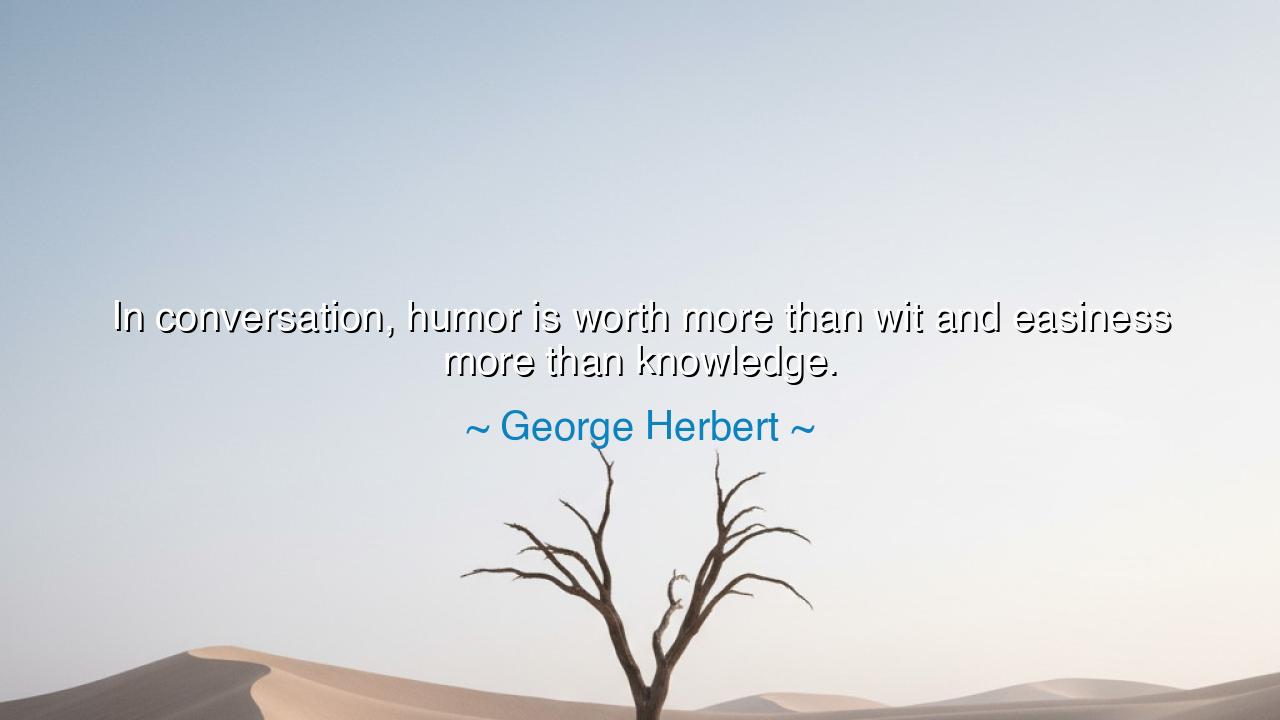
In conversation, humor is worth more than wit and easiness more






The words of George Herbert, “In conversation, humor is worth more than wit and easiness more than knowledge,” are like a lantern in the dim corridors of human communication. They speak to a truth as ancient as fellowship itself — that in the meeting of souls, the warmth of humor and the grace of ease open doors that intellect alone cannot. Knowledge may sharpen the tongue, but humor softens the heart. Wit may command attention, but easiness invites trust. Herbert, a poet and priest of the seventeenth century, lived in an age when conversation was both art and ritual, when men and women measured character not only by words spoken but by the feeling those words left behind.
To understand his wisdom, we must look beyond the words and into the rhythm of life itself. In every age, there are those who speak to impress, and those who speak to connect. The witty mind dazzles like lightning — brief, brilliant, but sometimes blinding. The humorous heart, however, shines like the sun — steady, kind, and life-giving. Humor is not the enemy of wisdom, but its companion; it transforms solemn truth into something that can be borne, shared, and remembered. It allows people to meet not in pride, but in joy — and joy is the truest foundation of human understanding.
There is an old tale of a king who invited philosophers from across the world to dine with him. They debated, argued, and displayed their learning until the hall grew tense and heavy. Then a jester entered, saying nothing wise, but everything true — he made the king laugh at his own pride and the scholars smile at their own seriousness. That night, the king said, “I have learned more from his humor than from their knowledge.” So it is with life: wisdom without warmth becomes arrogance; knowledge without kindness becomes a wall, not a bridge.
Herbert also speaks of easiness — a word not of laziness, but of gentleness. To be “easy” in conversation is to be at peace within oneself, to make others feel safe in your presence. It is the art of listening without judgment, of speaking without domination. Those who carry ease bring harmony wherever they go, for they have mastered not only their minds but their tempers. A single person with ease can soothe a room full of anxious hearts, as a still pond calms the wind above it. True eloquence, Herbert reminds us, is not in the brilliance of the tongue but in the serenity of the spirit.
Consider the story of Abraham Lincoln, a man burdened by the weight of a divided nation. In meetings filled with grave men and grave matters, Lincoln often broke tension with a humble joke or a light story. Many mistook it for folly, yet it was wisdom in disguise. His humor did not dismiss the pain of his times; it helped others bear it. Through laughter, he restored perspective, turning bitterness into cooperation, despair into resolve. Lincoln’s ease made him approachable even to enemies — and it was through that human touch that he held together a country on the edge of ruin.
Thus, Herbert’s teaching is not about conversation alone — it is about living with others in kindness. It is a call to choose empathy over ego, gentleness over pride. In our age, when words are often used to wound or to win, this wisdom is more vital than ever. Humor disarms, ease embraces, and together they transform speech into communion. Knowledge can fill books; only kindness fills hearts.
So, let us take this teaching to heart. When next you speak, remember that a smile may heal more than a speech, and a light word may bridge what knowledge alone cannot cross. Cultivate wit if you must, but temper it with laughter. Seek learning, but let it rest upon humility. For at the end of all eloquence, people do not remember what you knew — they remember how you made them feel. And that, as Herbert tells us, is the truest form of wisdom.






AAdministratorAdministrator
Welcome, honored guests. Please leave a comment, we will respond soon